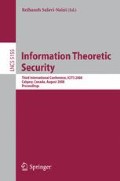Abstract
We present information-theoretically secure bit commitment, zero-knowledge and multi-party computation based on the assistance of an initialization server. In the initialization phase, the players interact with the server to gather resources that are later used to perform useful protocols. This initialization phase does not depend on the input of the protocol it will later enable. Once the initialization is complete, the server’s assistance is no longer required. This paper improves on previous work as there is only one server and it does not need to be trusted. If the server is honest, the protocols are secure against any coalition of dishonest players. If all players are honest, then there is an exponentially small probability that both the initialization phase succeeds and that later the protocol fails. That is, the server cannot create a situation in the initialization phase that would lead honest players to accuse each other. The protocols are built in a modular fashion and achieve linear complexity for the players in terms of the security parameter, number of players and the size of the circuit.
Access this chapter
Tax calculation will be finalised at checkout
Purchases are for personal use only
Preview
Unable to display preview. Download preview PDF.
References
Beaver, D.: Commodity-based cryptography (extended abstract). In: Proceedings of the 29th Annual ACM Symposium on Theory of Computing, pp. 446–455 (1997)
Beaver, D.: Server-assisted cryptography. In: Proceedings of the New Security Paradigms Workshop, pp. 92–106 (1998)
Ben-Or, M., Goldwasser, S., Wigderson, A.: Completeness theorems for noncryptographic fault-tolerant distributed computation (extended abstract). In: Proceedings of the 20th Annual ACM Symposium on Theory of Computing, pp. 1–10 (1988)
Cachin, C., Crépeau, C., Marcil, S.: Oblivious transfer with a memory bounded receiver. In: Proceedings of IEEE Symposium on Foundations of Computer Science, pp. 493–502 (1998)
Cachin, C., Maurer, U.: Unconditional security against memory-bounded adversaries. In: Kaliski Jr., B.S. (ed.) CRYPTO 1997. LNCS, vol. 1294, pp. 292–306. Springer, Heidelberg (1997)
Chaum, D., Crépeau, C., Damgård, I.: Multiparty unconditionally secure protocols (extended abstract). In: Proceedings of the 20th Annual ACM Symposium on Theory of Computing, pp. 11–19 (1988)
Cleve, R.: Controlled gradual disclosure schemes for random bits and their applications. In: Brassard, G. (ed.) CRYPTO 1989. LNCS, vol. 435, pp. 573–588. Springer, Heidelberg (1990)
Cramer, R., Damgaard, I., Dziembowski, S., Hirt, M., Rabin, T.: Efficient multi-party computations with dishonest majority. In: Stern, J. (ed.) EUROCRYPT 1999. LNCS, vol. 1592, pp. 311–326. Springer, Heidelberg (1999)
Cramer, R., Damgård, I., Maurer, U.: Efficient general secure multi-party computation from any linear secret-sharing scheme. In: Preneel, B. (ed.) EUROCRYPT 2000. LNCS, vol. 1807, pp. 316–334. Springer, Heidelberg (2000)
Crescenzo, G.D., Ishai, Y., Ostrovsky, R.: Universal service-providers for database private information retrieval. In: Proceedings of the 17th Annual ACM Symposium on Principles of Distributed Computing, pp. 91–100 (1998)
Crépeau, C.: Efficient cryptographic protocols based on noisy channels. In: Fumy, W. (ed.) EUROCRYPT 1997. LNCS, vol. 1233, pp. 306–317. Springer, Heidelberg (1997)
Crépeau, C.: Commitment. In: van Tilborg, H.C. (ed.) Encyclopedia of Cryptography and Security, vol. 12, pp. 83–86 (2005)
Crépeau, C., Graaf, J., Tapp, A.: Committed oblivious transfer and private multi-party computation. In: Coppersmith, D. (ed.) CRYPTO 1995. LNCS, vol. 963, pp. 110–123. Springer, Heidelberg (1995)
Crépeau, C., Kilian, J.: Achieving oblivious transfer using weakened security assumptions. In: Proceedings of IEEE Symposium on Foundations of Computer Science, pp. 42–52 (1988)
Crépeau, C., Morozov, K., Wolf, S.: Efficient unconditional oblivious transfer from almost any noisy channel. In: Proceedings of Fourth Conference on Security in Communication Networks, pp. 47–59 (2004)
Du, W., Han, Y.S., Chen, S.: Privacy-preserving multivariate statistical analysis: Linear regression and classification. In: Proceedings of the 4th SIAM International Conference on Data Mining, pp. 222–233 (2004)
Du, W., Zhan, Z.: Building decision tree classifier on private data. In: Proceedings of the IEEE ICDM Workshop on Privacy, Security and Data Mining, pp. 1–8 (2002)
Goldreich, O., Micali, S., Wigderson, A.: How to play any mental game. In: Proceedings of the 19th Annual ACM Symposium on Theory of Computing, pp. 218–229 (1987)
Kilian, J.: Founding cryptography on oblivious transfer. In: Proceedings of the 20th Annual ACM Symposium on Theory of Computing, pp. 20–31 (1988)
Kilian, J.: A note on efficient zero-knowledge proofs and arguments. In: Proceedings of the 24th Annual ACM Symposium on Theory of Computing, pp. 723–732 (1992)
Nascimento, A.C.A., Müller-Quade, J., Otsuka, A., Hanaoka, G., Imai, H.: Unconditionally non-interactive verifiable secret sharing secure against faulty majorities in the commodity based model. In: Jakobsson, M., Yung, M., Zhou, J. (eds.) ACNS 2004. LNCS, vol. 3089, Springer, Heidelberg (2004)
Rabin, T., Ben-Or, M.: Verifiable secret sharing and multiparty protocols with honest majority. In: Proceedings of the 21th Annual ACM Symposium on Theory of Computing, pp. 73–85 (1989)
Rivest, R.: Unconditionally secure commitment and oblivious transfer schemes using private channels and a trusted initializer (unpublished manuscript) (1999)
Yao, A.: Protocols for secure computations. In: Proceedings of IEEE Symposium on Foundations of Computer Science, pp. 160–164 (1982)
Yao, A.: How to generate and exchange secrets. In: Proceedings of IEEE Symposium on Foundations of Computer Science, pp. 162–167 (1986)
Author information
Authors and Affiliations
Editor information
Rights and permissions
Copyright information
© 2008 Springer-Verlag Berlin Heidelberg
About this paper
Cite this paper
Blier, H., Tapp, A. (2008). A Single Initialization Server for Multi-party Cryptography. In: Safavi-Naini, R. (eds) Information Theoretic Security. ICITS 2008. Lecture Notes in Computer Science, vol 5155. Springer, Berlin, Heidelberg. https://doi.org/10.1007/978-3-540-85093-9_8
Download citation
DOI: https://doi.org/10.1007/978-3-540-85093-9_8
Publisher Name: Springer, Berlin, Heidelberg
Print ISBN: 978-3-540-85092-2
Online ISBN: 978-3-540-85093-9
eBook Packages: Computer ScienceComputer Science (R0)

